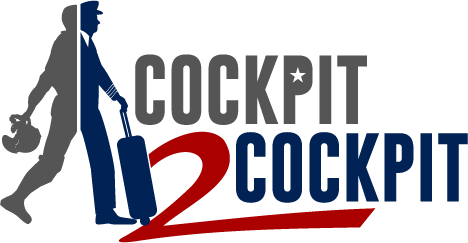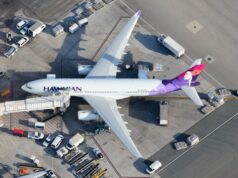The excitement of receiving your first Conditional Job Offer (CJO) from one of your top targeted airlines can be overwhelming. It’s a very proud moment. You probably spent countless hours perfecting your résumé, cleaning up your logbooks, filling out applications, and preparing for the interview. You worked hard for this moment and now you want to share it with the world. The first thing most pilots do is change their Facebook profile picture to the tail flash of their new employer and blast out a social media message to their friends announcing the CJO. Here is just some food for thought on why you might want to hold off on making a social media announcement to the world.
You are now swimming in “the pool”. In the aviation community, “the pool” is the term used to describe the time period between receiving the CJO and actually starting training. That period varies from one airline to the next and largely depends on your availability date, how many pilots were “swimming in the pool” ahead of you, and how many pilots the airline can squeeze through their training pipeline at any given time. The latter of those three factors, the training pipeline capacity, is generally the most limiting factor. Some pilots only spend a few weeks in the pool, but others have been left in the deep end for up to a year without a flotation device. I spent six months in the pool at my previous airline. I personally know several pilots who were left in the deep end of the pool for over a year at various airlines who hired many more pilots than their training pipeline capacity could handle.

Image provided by Marc Himelhoch
One thing to keep in mind while you’re treading water is that a Conditional Job Offer is just that — conditional. You are not getting paid yet, and although it is likely that the airline will get you into training at some point in the near future, it’s not a guarantee. In September 2001, I was stationed at Sheppard AFB, Texas. The airlines were hiring again after a long layoff in the 1990s. I personally knew at least a dozen pilots who had recently been hired by the airlines. Some of them left the military at the 12-to-18-year point with no retirement. They bought nice houses in other cities where they were going to be domiciled with their new airline. Then somebody decided to crash a few airliners into the Pentagon and World Trade Center, and, all of sudden, those guys/gals were out on the street. The lucky ones had already started training and were furloughed. When you are furloughed, you keep your pilot seniority number with the understanding that at some undetermined point in the future, the airline will recall you to work. Until then, you are essentially unemployed. It took over ten years for some of my pilot friends to be recalled to their airlines after being furloughed in the days after 9/11. The unlucky ones were waiting in the pool, and had their CJO’s taken away.
Even if the situation is not as extreme as the one I just described, you need to consider the possibility that even if this CJO is from your top-choice airline, depending on how long they leave you in the pool, you might need to take interviews with other airlines just to put food on the table. Of course that depends on your personal financial situation.
The other possibility is that the first CJO you receive is not from your top-choice airline and you were already planning to take interview invites from airlines that were rank-ordered higher up on your “dream sheet” list.
My point to all this is to say that you really need to consider how smart it is to blow up your social media profile with your CJO and the logo of the airline that just hired you. The next airline you interview with just might (read: probably will) do a Google search on you and it would be awkward, to say the least, if you are interviewing at Delta and your Facebook profile picture is the American Airlines tail flash!
Consider this CJO like your first combat deployment. You wanted to tell your friends and family where you were going and when you would be back, but OPSEC required you to stay silent. You probably want to make sure your spouse resists the temptation to announce your CJO on his/her social media accounts also, just in case. OK, it’s not quite as serious as OPSEC. I’m not saying you can’t call your friends and family to announce your recent success; phone calls don’t leave a trail of breadcrumbs for potential employers to follow. I’m just cautioning you against using social media as your messaging platform because social media is very easy for most anyone to see. Type in any name into the Facebook search bar (a name that is not already one of your contacts) and you will see what I’m talking about. You can see profile pictures at a minimum, and sometimes you can get a lot more information than that depending on the security settings that person has established. However, even if you think you have your accounts locked down so nobody except those you have given permissions to can see your information, I still wouldn’t risk it.
So when is it safe to make your big announcement to the world on social media? After all, you’ve worked really hard to get to this point in life and there is nothing wrong with basking in the moment if the conditions are correct. I would offer you two conditions to meet before you make a social media CJO announcement:
The airline has given you a confirmed class start date. Once you have a class start date, chances are pretty good that this is for real. If you want to play it more conservatively, you could wait until you actually start class and have a company ID badge (which usually happens on Day 1). Or you could go with my wife’s ultra-conservative philosophy that nothing is real until the first paycheck clears the bank.
You are 100% certain that this is the airline you want to retire from at age 65. If this airline was not your #1 choice, or at least an airline that you are happy to call your new #1, then hold off on any social media announcements. As mentioned previously in this article, you don’t want to be in the situation of interviewing at another airline with your current airline employer logo prominently displayed on your social media account.
While I’m on the subject of social media, it is really important to clean up your social media profiles before you hit send on your first airline application. Any material that might be considered offensive or off-color needs to be removed (which might cover about 98% of some pilots’ social media posts). Also, remove all those party pictures with drink in hand. I was amazed when I went to clean up my Facebook page just how many pictures had alcohol in them. I know you don’t have a drinking problem, and you know you don’t have a drinking problem, but the human resources folks at XYZ airline may not know that you don’t have a drinking problem.
I cover this topic and many others related to the military to airline transition process in Cockpit2Cockpit
.























































































































